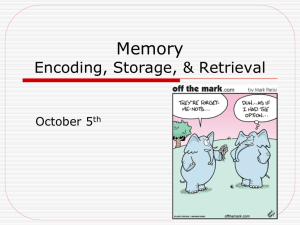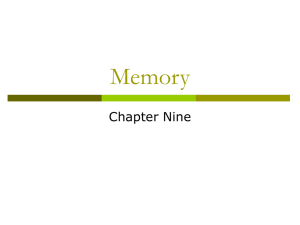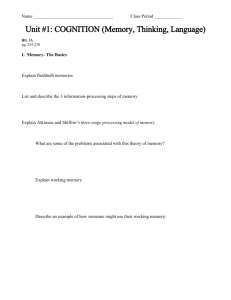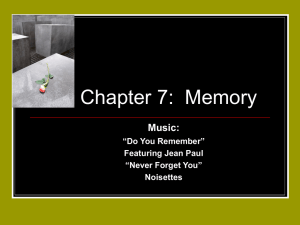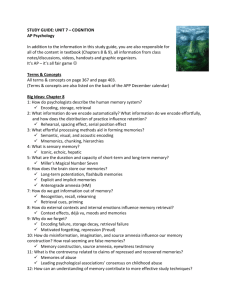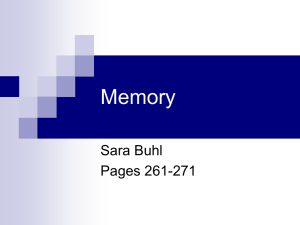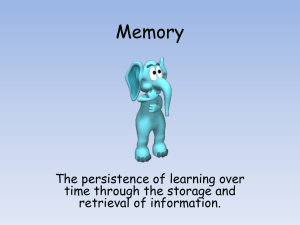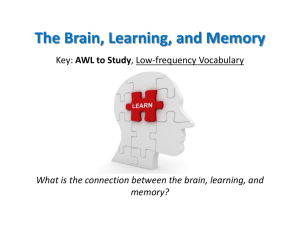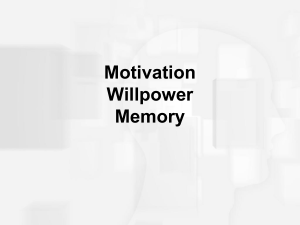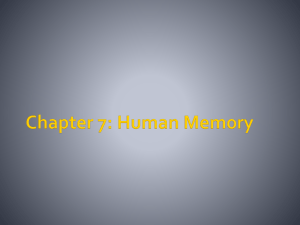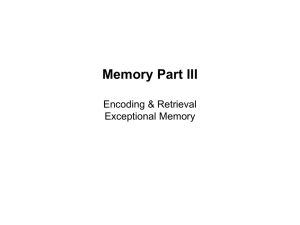Memory - KCSD Connect
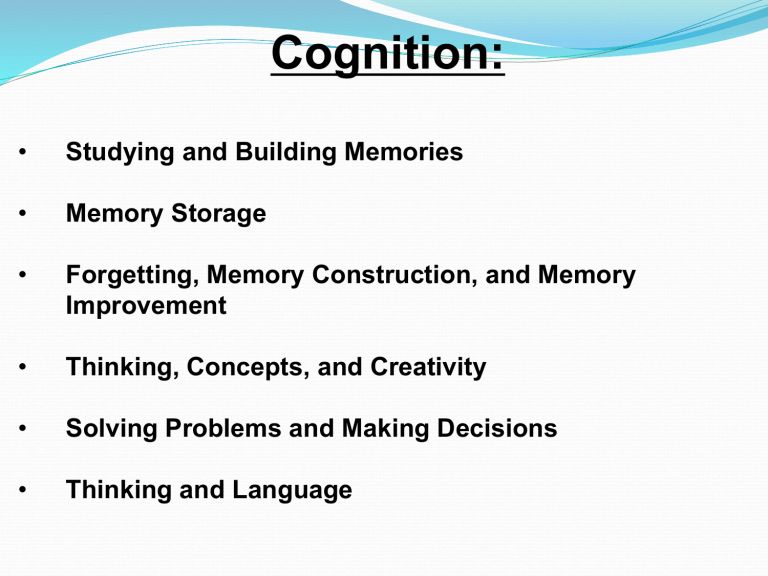
Cognition:
• Studying and Building Memories
• Memory Storage
• Forgetting, Memory Construction, and Memory
Improvement
• Thinking, Concepts, and Creativity
• Solving Problems and Making Decisions
• Thinking and Language
Introduction
Memory Capacity Activity
TED Talk: The Fiction of Memory by Elizabeth Loftus https://www.ted.com/playlists/196/the_complexity_of_ memory
Module 31: Studying & Building
Memories
MEMORY: The persistence of learning over time through the encoding, storage, and retrieval of information.
Sensory Memory works as a filter. It allows us time to determine what to pay attention to.
Working Memory
Information Processing
https://educationportal.com/academy/lesson/informationprocessing.html
Building Memories: Encoding
Explicit Memory: Memory of facts and experiences that one can consciously know and “declare.”
Effortful Processing: Encoding that requires attention and conscious effort.
Automatic Processing: Unconscious encoding of incidental information, such as space, time, and frequency, and of welllearned information, such as word meanings.
Implicit Memory: Retention independent of conscious recollection (skills we learn).
Categorizing Memory
https://educationportal.com/academy/lesson/categorizingmemory.html
How does sensory memory work?
Iconic Memory: A momentary sensory memory of visual stimuli; a photographic or picture-image memory lasting no more than a few tenths of a second.
Echoic Memory: A momentary sensory of auditory stimuli; if attention is elsewhere, sounds and words can still be recalled within 3 or 4 seconds.
Short-Term or Working Memory Use it or lose it!!!!!
Working with information…..
Chunking = Grouping items to make them easier to remember https://education-portal.com/academy/lesson/improving-shortterm-memory.html
Short-Term or Working Memory Use it or lose it!!!!!
Working with information…..
Mnemonic Devices = Techniques for using associations to memorize and retrieve information
Famous Mnemonic Devices
Read each sentence or phase and record what it stands for.
Please Excuse My Dear Aunt Sally-
Richard Of York Gave Battle In Vain-
Every Good Boy Deserves Fudge-
King Phillip Cried Out For Good Soup-
My Very Educated Mother Just Served Us Noodles-
Super Man Helps Every One-
Famous Mnemonic Devices
Read each sentence or phase and record what it stands for.
Please Excuse My Dear Aunt Sally-
(Parentheses, exponents, multiplication, division, addition, subtraction)
Richard Of York Gave Battle In Vain-
(Red, Orange, Yellow, Green, Blue, Indigo, Violet)
Every Good Boy Deserves Fudge-
(E,G,B,D,F)
King Phillip Cried Out For Good Soup-
(Kingdom, Phylum, Class, Order, Family, Genus, Species)
My Very Educated Mother Just Served Us Noodles-
(Mercury, Venus, Earth, Mars, Jupiter, Saturn, Uranus, Neptune)
Super Man Helps Every One-
(Superior, Michigan, Huron, Erie, Ontario)
Module 32: Memory Storage and Retrieval
Retaining Information in the Brain
Memories are NOT stored in one part of the brain.
Memory and the Brain
We are still learning about the role of the brain in
MEMORY. To what extent the brain is involved is still being determined.
Storage:
Long-Term Memory
hippocampus --neural center in limbic system that helps process explicit memories for storage
Processes explicit memories – then sent to multiple different regions.
Hippocampus
Long-Term Memory
Types of Long-Term Memory
Episodic memory
– memory of our own life (Personal facts)
Semantic memory
– knowledge of language, including rules, words, and meanings
Declarative memory
–
Stored knowledge called forth consciously as needed; includes episodic and semantic
Procedural memory
–
Storage of learned skills that does not require conscious recollection
Memory Storage
DID YOU KNOW!
Flashbulb Memories are vivid recollections of events that are shocking or emotional
The SQ3R method of studying improves your ability to recognize and recall information
FACT: 59-year-old Akira Haraguchi recited from memory the first
83,431 decimal places of pi, earning a spot in the Guinness World
Records.
FACT: Super card sharks can memorize the order of a shuffled deck of cards in less than a minute
FACT: According to evidence, it's impossible to recall images with near perfect accuracy
Photographic memory – ability to form sharp, detailed visual images of a picture or page and to recall exactly what you saw.
DOES IT EXIST?
Superior Autobiographical Memory
http://www.cbsnews.com/news/the-gift-of-endlessmemory/
Module 33: Forgetting, Memory,
Construction, and Memory
Improvement
Encoding Failure
Retrieval Failure
Motivated Forgetting
• Self-serving personal histories
• Repression
FORGETTING
Types
Decay – fading away of memory over time
Amnesia – loss of memory as a result of a blow to head or brain damage. Other causes: Stress/Drugs
Interference – blockage of a memory by previous or subsequent memories or loss of a retrieval cue
•Proactive Interference: prior learning interferes with learning new information
• Retroactive Interference: newly learned information interferes with previously learned information
Memory Construction Errors
Misinformation and Imagination
Source amnesia (source misattribution)
Déjà vu
Discerning True and False Memories
Repressed or Constructed Memories
• Eyewitness Testimony
•
It is often wrong
• Involves recognition
• Memory of event is often distorted
• Eyewitnesses can be misled by questioning
Improving Memory
• Rehearse repeatedly
• Make the material meaningful
• Activate retrieval cues
• Use mnemonic devices
• Minimize interference
• Sleep more
• Test your own knowledge, both to rehearse it and to help determine what you do not yet know
Module 34: Thinking,
Cognition, and Creativity
Creativity
• Ways to boost creativity
– Develop your expertise
– Allow time for incubation
– Set aside time for the mind to roam freely
– Experience other cultures and ways of thinking
Module 35: Solving Problems and
Making Decisions
Problem Solving:
Strategies and Obstacles
• Algorithms
– Step-by-step
• Heuristic
• Insight
• Confirmation bias
• Mental set
Forming Good and Bad Decisions and
Judgments
• Intuition
– Automatic unreasoned feelings and thoughts
– Seat of their pants
• The Representative Heuristic
– Prototype
•
– Likelihood of something
•
Overconfidence
Belief perseverance
– Consider the opposite
Framing
Module 36: Thinking and Language
Language and Language
Acquisitions
https://education-portal.com/academy/lesson/whatis-language.html
https://educationportal.com/academy/lesson/languageacquisition.html
Language Development
• Receptive language
• Productive language
– Babbling stage
– One-word stage
– Two-word stage
– Telegraphic speech
Language Development
Language and the Brain
•
•
• Aphasia
Broca’s Area
Wernicke’s Area
Language
What is language?
https://education-portal.com/academy/lesson/what-islanguage.html
Language Acquisition
https://educationportal.com/academy/lesson/language-acquisition.html
